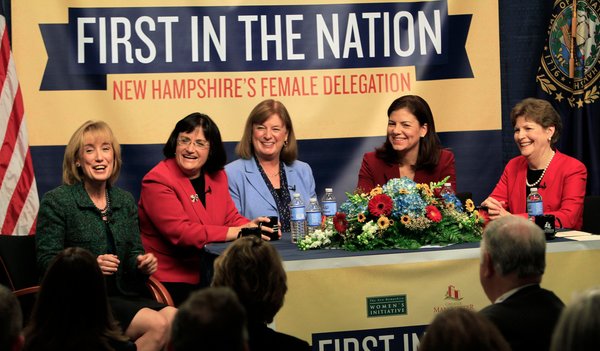New Hampshire’s All Female Delegation Takes the Stage Tomorrow
January 2, 2013
 By KATHARINE Q. SEELYE for The New York Times – Most states are red or blue. A few are purple. After the November election, New Hampshire turned pink.
By KATHARINE Q. SEELYE for The New York Times – Most states are red or blue. A few are purple. After the November election, New Hampshire turned pink.And the matriarchy does not end there. New Hampshire’s new governor is a woman. So are the speaker of the State House and the chief justice of the State Supreme Court.
“Pink is the new power color in New Hampshire,” declared Ann McLane Kuster, one of the newly elected representatives, at a recent forum at the New Hampshire Institute of Politicsat St. Anselm College in Manchester, where the women’s historic milestone was celebrated.
These women did not rise to the top together overnight. Nor was there an orchestrated movement to elect them. Each toiled in the political vineyards, climbed the ladder in her own time and campaigned hard for her job. But they have caught the state’s collective imagination, inspiring forums and media interest and prompting Jay B. Childs, a New Hampshire filmmaker, to make a documentary about them.
Senator Jeanne Shaheen, 65, a Democrat and dean of the delegation, was the state’s first elected female governor and the first woman in United States history to be elected both governor and senator.
Senator Kelly Ayotte, 44, a Republican, was the state’s former attorney general.
Carol Shea-Porter, 60, a Democrat and former member of the House, lost her seat in 2010 and won it back in November.
Ms. Kuster, 56, a Democrat, is a lawyer and lobbyist who has not held office before but has long been active in the state and comes from a political family.
Maggie Hassan, 54, a Democrat and the new governor, was majority leader of the State Senate.
Women will make up 20 percent of the new Senate and 17.9 percent of the new House. These are records in Washington, but they fall far short of matching the 50.8 percent of the general population that is female.
While New Hampshire is doing more than its share of bolstering the number of women on Capitol Hill, six states — Alaska, Delaware, Iowa, Mississippi, North Dakota and Vermont — have never elected a woman to the House. And four of those — Delaware, Iowa, Mississippi and Vermont — have never sent a woman to the Senate.
The state after New Hampshire, with the next highest proportion of women in its Congressional delegation, is Hawaii, where both House members and one senator are women.
In only three other states, Maine, Missouri and Washington, do women make up at least half of the delegations. Sixteen states, including New Jersey, have no women in Congress.
Although the women in New Hampshire are serving all at once by happenstance, women have long held prominent positions in New Hampshire government.
One reason is the size of the State House, a typical pipeline for aspiring politicians. It has 400 members, making it the largest of the states and the fourth-largest governing body in the English-speaking world (after the United States Congress, the British Parliament and the Indian Parliament). With so many seats available, women have a better chance of being elected in New Hampshire than they have in many other states.
New Hampshire also has a long history of volunteerism, and serving in the General Court, as the legislature is known, amounts to an act of volunteerism because it pays just $100 a year, plus mileage. Every year since 1975, more than 100 women have served.
“There are lots of opportunities for women to pitch in, prove their competence and learn a lot about governing and the political process,” Ms. Hassan said in an interview. “We’ve had a very deep bench of women.”
Even if the legislature in New Hampshire is big, the state itself is small. That makes it easier for everyone to know everyone else, and most of the women in the Congressional delegation have intricate ties to one another.
Read more at The New York Times – http://www.nytimes.com/2013/01/02/us/politics/from-congress-to-halls-of-state-in-new-hampshire-women-rule.html?hp&_r=0

